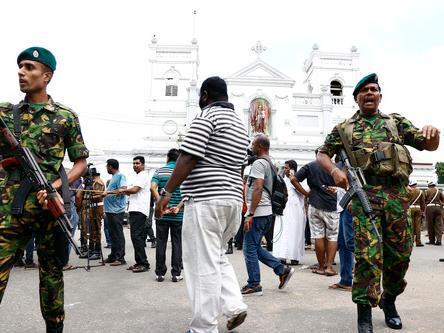
Sri Lankan health minister speaks as death toll from blasts rises to 290 and more than 500 injured
The Sri Lankan Minister of Health Rajitha Senaratne held a press conference on Monday as the death toll for a string of bomb attacks targeting churches and hotels in Sri Lanka on Easter Sunday has risen to 290, police said.
"Terrorism needs only needs one second to get out of our sight," he told journalists.
He pledged 1 million Sri Lankan Rupees (around €5,102) would go to each of the families of those killed in the blasts, as well as 100,000 Sri Lankan Rupees (around €510) rupees to go towards funeral expenses.
Around 500 people were also injured in the explosions, which rocked the country on Sunday.
Police spokesman Ruwan Gunasekera declined to give a breakdown of those killed and wounded.
The attacks marked the most significant violence in the country since a bloody civil war ended 10 years ago.
Three police officers were killed during a raid on a house in Colombo after the attacks, some of which were suicide bombings, according to officials.
Seven people have been arrested, local media reported.
Six of the blasts — hitting three churches and three hotels — were reported in quick succession in the morning with the other two blasts hitting later.
The seventh was in Dehiwela, a few kilometres south of capital Colombo, shortly after 10.40 am CEST. It was the fourth explosion to target a hotel. The national zoo, located near the hotel, was then closed.
The last one was at a house in northern Colombo, authorities said.
The government responded by imposing a curfew and shutting down access to social media and messaging services.
Prime Minister Ranil Wickremesinghe said in a tweet: "I strongly condemn the cowardly attacks on our people. I call upon all Sri Lankans during this tragic time to remain united and strong."
"Please avoid propagating unverified reports and speculation. The government is taking immediate steps to contain this situation," he added.
'We feared an earthquake'
More than 50 of the fatalities were killed in just one church, St. Sebastian's in Katuwapitiya, north of Colombo. The church posted pictures of destruction on its Facebook page, showing blood on pews and the floor, and requested help from the public.
The two other religious premises hit were St Anthony's Church in Kochcikade, Colombo and the evangelical Zion church in Batticaloa, in Eastern Province.
The first three hotels affected were the Shangri-La Colombo, Kingsbury Hotel and Cinnamon Grand Colombo. It was unclear whether there were any casualties in the hotels.
Akshat Saraf, 30, from Bangalore in India, was staying at the Shangri-La hotel, in eastern Colombo, with his family when the venue's coffee shop was hit by an explosion.
"We were in our room on the 25th floor when we felt strong tremors. We rushed downstairs fearing an earthquake," he told NBC News.
"All the guests were evacuated and escorted to an open area right outside the hotel premises for safe keeping.
"We are very thankful for the helpful and very capable staff at the Shangri-La Colombo. They, along with all the rescue teams, were the real heroes today.
"What has been done is a despicable act against humanity," he added.
At least 32 foreigners were among the dead, government officials said.
According to officials five British people, two of whom had dual U.S. citizenship, one Portuguese national, and three Indians were among those killed.
A Dutch citizen and three people from Denmark were also killed. Chinese and Turkish state media also reported their citizens were among the victims.
US Secretary of State Mike Pompeo said US nationals were among the dead but did not provide details.
Government imposes curfew
The Buddhist-majority country emerged from a bloody civil war against Tamil separatists a decade ago during which explosions in the capital were common but a lull in such attacks had since been observed.
There were no immediate claims of responsibility.
The government has imposed a curfew with immediate effect to last until 06:00 local time on Monday and cut access to major social media platforms and messaging services to curb the spread of misinformation.
Education Minister Akila Viraj Kariyawasam announced on Twitter that all schools in the country would be closed on Monday and Tuesday.
'Government discrimination persists'
Christians represent 7.6% of the island's population of 22 million, according to the 2012 census, behind Muslims (9.7%), Hindus (12.6%) and Buddhists (70%).
Last year, there were 86 verified incidents of discrimination, threats and violence against Christians, according to the National Christian Evangelical Alliance of Sri Lanka (NCEASL), which represents more than 200 churches and other Christian organisations.
This year, the NCEASL recorded 26 such incidents, including one in which Buddhist monks allegedly attempted to disrupt a Sunday worship service, with the last one reported on March 25.
The US State Department report into human rights practices in Sri Lanka released in April 2018 found that government discrimination towards nondenominational Christian groups persisted.
"Sources stated some Buddhist monks regularly tried to close down Christian and Muslim places of worship on the grounds they lacked the Ministry of Buddha Sasana's approval," the report detailed.
Urgently seeking information
The British Foreign Office told Euronews that it is "urgently seeking information from local authorities" after reports emerged that one of the foreigners killed might be British.
The country's High Commissioner, James Dauris, wrote on Twitter that he had visited "Brits in hospital who have been affected" but did not disclose how many there were or if any British citizens had been killed.
The German embassy in Colombo also announced on Twitter that it is "working hard to find out whether German citizens are affected," describing the situation as "confusing." It also warns that those departing the island should be at the airport no later than four hours before departure due to tightened security measures.
(EURO NEWS)

